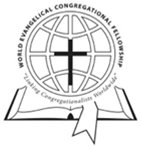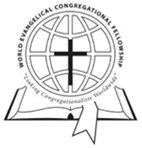Member Fellowships

Argentina
Evangelical Congregational Churches, Argentina

Australia
The Fellowship of Congregational Churches is a conservative Congregational denomination in Australia. It was formed by the forty congregations of the Congregational Union of Australia who chose not to join the Uniting Church in Australia in 1977.

Brazil
Alliance of Evangelical Congregational Churches, Brazil

Brazil
Union of Evangelical Congregational Churches, Brazil
The Union of Evangelical Congregational Churches in Brazil is an association of churches of Congregational origin in Brazil. It was founded by a couple namely Robert Reid Kalley and Sarah Poulton Kalley, who arrived in Rio de Janeiro in May 1855 to begin mission work. The work developed. The first believer was baptised in November, 1857. In 1858 the first church was organised. The evangelists and the Kalley’s work spread to the North-eastern part of Brasil, specially in Recife and Pernambuco state. Robert and Sarah Kalley returned to Scotland in 1876. In 1913 thirteen church formed the United Independent Evangelical Churches. Robert died in 1888 but Sarah continued to raise funds for Brazil. She died in 1907. In 1942 Congregational churches united to form the Evangelical Christian Churches in Brazil. Later it became the Union of Evangelical Congregational Churches in Brazil.

Bulgaria
Union of Congregational Churches, Bulgaria
The Union of Evangelical Congregational Churches in Bulgaria is a Reformed Congregational denomination in Bulgaria. A member of the World Communion of Reformed Churches and the World Evangelical Congregational Fellowship.

Canada
The Congregational Christian Churches in Canada (or 4Cs) is an evangelical, Protestant, Christian denomination, headquartered in Simcoe, Ontario.
The 4Cs represent a family of about 30 evangelical churches across Canada, each one committed to living out the Biblical witness of Jesus Christ — His Great Commands and Great Commission — in the power of the Holy Spirit. The 4Cs is a member of the Evangelical Fellowship of Canada. Its congregations have a strong desire to present and represent Jesus to willing listeners, to pray for revival, to foster caring in both global and local mission projects, and to work hand-in-hand with committed Christians of other denominations.

India
Evangelical Churches Association (Congregational), Manipur, India

Republic of North Macedonia
website:
www.escrkva.mk

Micronesia
Chuuk Congregational Church of Christ, Federated States of Micronesia

Myanmar
Evangelical Churches Association, Myanmar

Nepal
Evangelical Congregational Churches, Nepal

New Zealand
The CONGREGATIONAL UNION OF NZ is a small group of 14 churches. Each church is autonomous with Christ as the Head of the church. There is no hierarchy or head office as each church is responsible to run itself under the Lordship of Jesus Christ through His Word and the guidance of the Holy Spirit.

Northern Ireland
The Congregational Union of Ireland is strongly associated with the Puritans and Oliver Cromwell. The Irish Congregational Church was formed in 1829. In 1899 it absorbed the Irish Evangelical Society. By 1927 there were about 10,000 members in Ireland. The denomination affirms the Savoy Declaration.

Philippines
National Association of Congregational Churches, Philippines

Portugal
Union of Congregational Churches, Portugal

South Africa
Evangelical Fellowship of Congregational Churches, Republic of South Africa

United Kingdom
The Evangelical Fellowship of Congregational Churches is a group of over 100 evangelical churches in England, Wales, and Northern Ireland. The EFCC was formed in 1967 to unite gospel centred evangelical and congregational churches together.

United States of America
The Conservative Congregational Christian Conference is a theologically conservative denomination believing strongly in the autonomy of each local church under the headship of Christ. Our member churches include those who are Congregational, Christian, and Evangelical and Reformed in their background, as well as independent Community churches. Our member ministers also come from diverse backgrounds. Though we are solidly committed to the basic doctrines of the Christian faith, we allow for diversity in many areas where Christians have tended to disagree. Though our members hold strong biblical convictions, we do not believe that Christians should divide over secondary issues. As an evangelical denomination, in obedience to Jesus Christ, we work together to advance the kingdom of our Lord through evangelism, church planting and missions.
Associate Members

